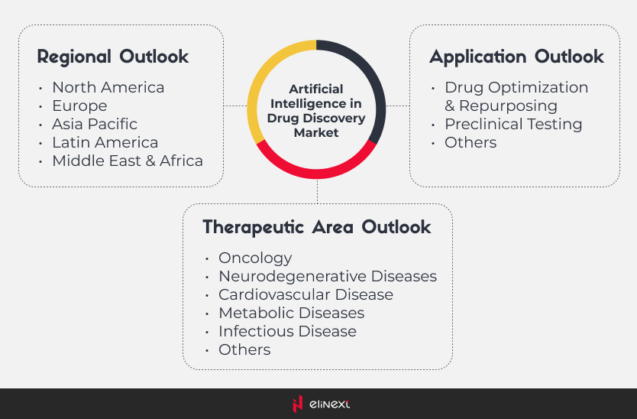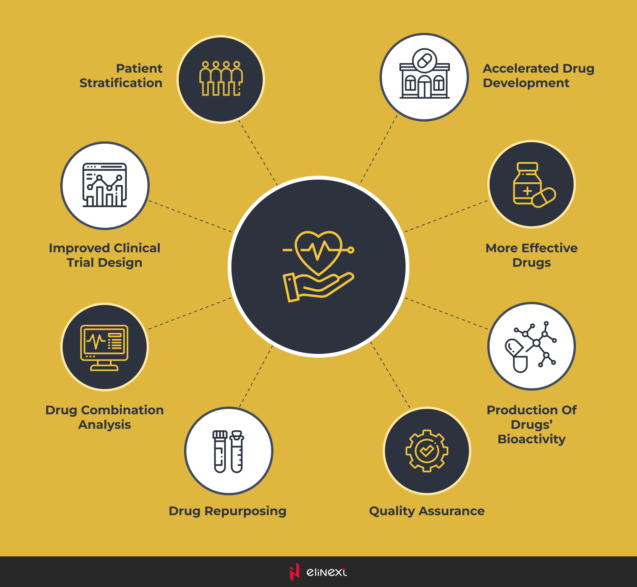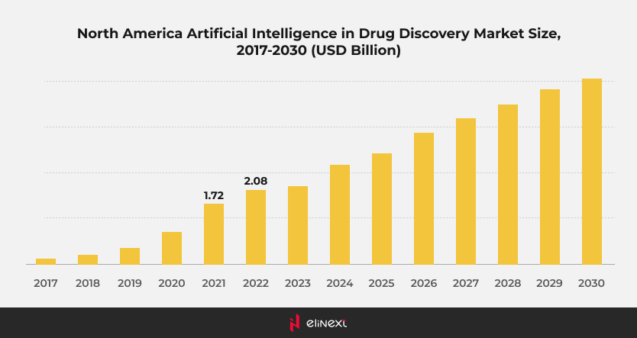The drug discovery market is booming, forecasted to reach $221.71 billion by 2030. This growth is driven by innovations in technologies like high-throughput screening and pharmacogenomics. Artificial intelligence (AI) is transforming the industry, speeding up target identification, predicting drug interactions, and enhancing clinical trials. AI’s ability to process vast datasets is revolutionizing the journey from lab to life-saving medication.
The Role of Artificial Intelligence in Drug Discovery Market
AI significantly accelerates the drug discovery process and reduces costs. It excels in target identification, drug interaction predictions, and clinical trial optimization. Analyzing huge datasets, AI quickly identifies promising compounds, enhances precision, and increases the success rate. As a result, it is pivotal in bringing vital medicines to market faster.
Transform your AI drug discovery process with our solutions. Let’s change the future of healthcare together.
Applications of AI for Drug Discovery
-
Target Selection and Validation
AI and ML models rapidly analyze vast biological data to identify potential drug targets. They predict target interactions and behavior, enhancing accuracy and efficiency, thus speeding up the drug discovery process.
-
Compound Screening and Lead Optimization
AI analyzes massive chemical datasets to identify potential drug candidates quickly. It can also predict molecular properties and interactions, simulate chemical reactions and optimize compound structures, reducing the development time and cost.
-
Preclinical Studies
AI analyzes extensive data to predict drug safety, simulates biological processes, identifies side effects, and optimizes dosages. This streamlines experiment data, improving accuracy, reducing time and costs, and speeding up clinical testing.
-
Clinical Trials
AI identifies suitable participants, predicts outcomes, and monitors patient data in real-time. It enhances data analysis, streamlines trial management, and reduces costs and duration, ensuring more efficient and accurate results.
The Role of Generative AI in Drug Discovery
Generative AI is revolutionizing drug discovery by designing novel compounds and predicting their properties. It analyzes vast datasets to generate potential drug candidates, significantly speeding up the initial phases of drug development. This technology improves efficiency, reduces costs, and enhances the precision of finding viable drugs.
Unlock the future of AI and drug discovery with our solutions. Discover the cutting-edge technology that enhances efficiency and precision in drug development.
Generative AI is a game-changer in drug discovery, offering unparalleled speed and precision in designing novel compounds. By leveraging vast datasets, it can predict properties and generate viable drug candidates, revolutionizing the early stages of drug development.
Benefits of AI in Drug Discovery Market
The integration of artificial intelligence into the drug discovery market opens new opportunities. AI offers significant benefits to the industry, including:
-
Accelerated Drug Development
AI speeds up the drug discovery process by rapidly analyzing large datasets. This significantly reduces the time required to bring new drugs to market.
-
More Effective Drugs
AI enhances the precision of target identification and validation. As a result, drug candidates are more effective and tailored to specific medical needs.
-
Improved Clinical Trial Design
AI streamlines participant selection and data analysis, leading to more efficient trials. This increases the success rates and reduces the time and cost of clinical trials.
-
Prediction of Drugs’ Bioactivity
Artificial intelligence predicts the bioactivity of potential drug compounds with high accuracy. This improves the selection of viable candidates for further development.
-
Drug Repurposing
AI identifies new therapeutic uses for existing drugs. This practice extends the life cycle of current medications and can reduce the time and cost associated with bringing new treatments to market.
-
Drug Combination Analysis
AI evaluates the interactions and synergies between different drugs. This optimizes combination therapies, leading to enhanced efficacy and better patient outcomes.
Challenges of Using Artificial Intelligence in Drug Discovery
-
Data Privacy and Regulatory Compliance
Ensuring compliance with regulations and protecting patient data privacy is complex. Regulations vary across regions, adding to the complexity of global AI implementation.
-
Data Quality and Quantity
AI’s success hinges on high-quality, extensive datasets. Obtaining and curating such data can be challenging, as data must be accurate, complete, and representative to train effective models.
-
Cost and Technical Expertise
Implementing AI solutions is costly and demands specialized technical expertise. Many companies may lack the financial resources or skilled personnel required for effective AI integration.
-
Interpretability and Transparency
AI models can be complex, making their decisions hard to interpret. This lack of transparency can hinder trust and make it difficult to meet regulatory requirements for explainability.
-
Lack of Standardization
The absence of standardized protocols and practices in AI applications can hinder collaboration and integration. This leads to inconsistencies in AI implementation and results across the industry.
Harness the power of AI in your drug discovery journey. We’ll help you overcome challenges, optimize efficiency, and accelerate the development process.
Real Use Cases of Artificial Intelligence in Drug Discovery
-
Cancer Treatment Compound Discovery
AI rapidly analyzes vast datasets to identify potential drug candidates that specifically target cancer cells. This approach significantly reduces the time and cost associated with traditional drug discovery methods, leading to more efficient and targeted therapies for cancer patients.
-
MEK Protein Inhibitor Identification
AI assists in identifying MEK protein inhibitors by analyzing molecular interactions and predicting effective compounds. This accelerates the discovery of potential inhibitors that can target and disrupt cancer cell growth. This enables researchers to pinpoint promising candidates more efficiently.
-
Alzheimer’s Disease Therapeutic Targeting
AI aids in Alzheimer’s disease therapeutic targeting by analyzing genetic, clinical, and imaging data to identify new treatment pathways. This accelerates the discovery of potential drugs and optimizes therapy development, offering hope for more effective interventions against this complex disease.
-
Novel Antibiotic Discovery
AI is used to analyze microbial genomes and predict potential antibiotic compounds. This approach identifies new candidates more efficiently, addressing the growing issue of antibiotic resistance and ensuring the development of effective treatments for bacterial infections.
-
COVID-19 Therapeutic Research
Analyzing vast datasets, artificial intelligence and ML algorithms predict drug efficacy and safety, optimizing the development of therapies to combat the virus and its variants.
AI in Drug Discovery Market: COVID-19 Impact
The COVID-19 pandemic has accelerated the adoption of AI in drug discovery. AI technologies have been pivotal in identifying potential treatments and vaccines, speeding up research and development processes. This shift has highlighted AI’s critical role in rapidly responding to global health crises.
Future of AI in Drug Discovery Market
The future of AI in the drug discovery market is highly promising, with advancements in machine learning and data analytics leading the way. AI drives innovation, streamlines research processes, and reduces development costs. As technology evolves, AI’s role will expand to develop more effective, personalized treatments, ultimately revolutionizing how new drugs are discovered and brought to market.
Conclusion
The integration of AI in drug discovery is transforming the pharmaceutical industry by enhancing efficiency, precision, and innovation. From accelerating drug development to optimizing clinical trials, AI offers numerous benefits that streamline the entire process. While challenges such as data privacy, regulatory compliance, and the need for technical expertise exist, the potential rewards far outweigh the obstacles.
FAQ
1. How is machine learning used in pharmaceutical research?
ML in pharmaceutical research analyzes vast datasets to predict drug efficacy, safety, and interactions. It accelerates drug discovery, optimizes compound selection, and streamlines clinical trials.
2. How is AI impacting personalized medicine?
AI changes personalized medicine by analyzing genetic data and lifestyle factors. This leads to highly tailored treatment plans, better diagnosis accuracy, and predictive disease risk assessments.
3. What is the role of natural language processing (NLP) in drug discovery?
NLP in drug discovery analyzes scientific literature and patents to identify new drug targets, understand disease mechanisms, and extract valuable insights, accelerating the research process.
4. How does AI assist in drug repurposing?
AI identifies new therapeutic uses for existing drugs by analyzing libraries, clinical trials, and medical records. It accelerates the discovery of alternative treatments, optimƒizing drug utilization.












